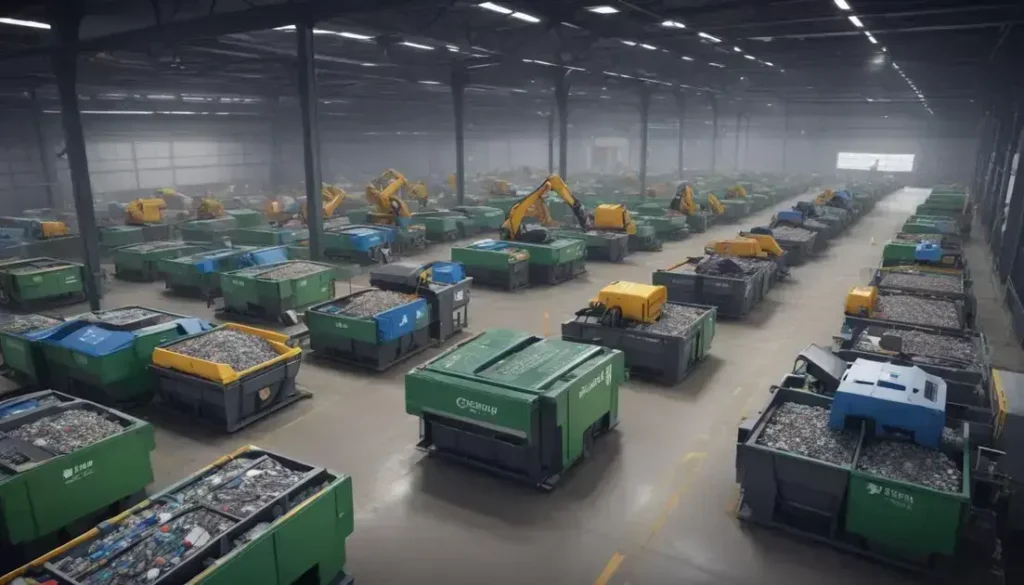Recycling technologies in the UK are evolving rapidly, driven by innovations like AI and smart systems, enhancing efficiency, reducing waste, and fostering a circular economy.
In a bold move towards sustainability, Recycling efforts in the UK are witnessing a significant upgrade with new AI technology. Why is this important?
Introduction to Tetra Pak’s AI recycling initiative
Tetra Pak’s recent initiative harnesses the power of Artificial Intelligence to enhance its recycling processes significantly. This innovative approach aims to improve the sorting and processing of materials, making recycling more efficient and effective.
The Role of AI in Recycling: By employing advanced algorithms and machine learning, Tetra Pak can identify and separate different materials intelligently. This capability reduces contamination and increases the quality of recycled materials, ultimately leading to better sustainability outcomes.
The initiative aligns perfectly with the growing global focus on sustainability, supporting a circular economy where resources are reused rather than discarded. Furthermore, this advancement helps address the challenges of waste management, particularly in urban environments where recycling rates often lag.
Partnerships with tech firms are also an essential aspect of this initiative, enabling Tetra Pak to stay at the forefront of innovation. Through collaboration, they develop solutions that not only meet regulatory requirements but also surpass industry standards in environmental responsibility.
Ultimately, Tetra Pak’s AI recycling initiative sets a precedent for the entire industry, demonstrating how technology can drive significant progress in sustainability efforts.
Importance of advanced recycling technology
The importance of advanced recycling technology cannot be overstated in today’s environmentally conscious world. These innovations help improve the efficiency of recycling processes and enhance the quality of recycled materials, making them more appealing for reuse.
Efficiency Gains: By utilising state-of-the-art machinery and AI algorithms, recycling facilities can automate sorting processes that were once manual. This automation not only speeds up operations but also significantly reduces contamination rates, ensuring that more material can be effectively processed.
Moreover, advanced technologies enable facilities to recycle a broader range of materials. For instance, complex packaging materials that were previously deemed non-recyclable can now be processed effectively thanks to technological advancements. This capability directly contributes to reducing landfill waste and conserving natural resources.
Additionally, integrating data analysis into recycling practices allows for better decision-making and process optimisation. Facilities can track performance, identify bottlenecks, and adjust methods to maximise output and efficiency. Such data-driven approaches foster a more sustainable future and encourage corporate responsibility.
Ultimately, advanced recycling technology plays a pivotal role in shaping a circular economy, where waste is minimised, and materials are continuously reused. Investing in these technologies will pave the way for a greener planet.
Impact on UK waste management practices
The impact on UK waste management practices has been profound in recent years, driven by advancements in technology and changing consumer behaviour. With growing awareness of environmental issues, the UK has prioritised enhancing recycling rates and reducing landfill dependency.
As a result, local authorities are adopting innovative strategies to improve waste separation and processing. These strategies include implementing new recycling schemes and investing in smart bins that utilise sensors to monitor waste levels, ensuring timely collection.
The introduction of comprehensive education campaigns has also played a crucial role. These initiatives aim to inform the public about proper recycling practices, helping to minimise contamination and increase the volume of recyclables collected. By encouraging individuals to engage in more sustainable behaviours, the UK is fostering a culture of recycling.
Additionally, collaborations between government bodies, businesses, and community organisations are essential for shaping waste management policies that reflect local needs. This collaborative approach not only enhances overall efficiency but also positions the UK as a leader in sustainable waste management.
Ultimately, these changes are contributing to a significant reduction in carbon footprints across the country, demonstrating that effective waste management practices are vital for achieving broader sustainability goals.
Partnerships driving innovation in recycling
Partnerships are essential in driving innovation in recycling, as collaboration brings together expertise from different sectors. In recent years, companies, governments, and non-profits have united to address the urgent challenges of waste management and environmental sustainability.
One notable example is the collaboration between tech firms and recycling organisations. These partnerships harness advanced technologies such as artificial intelligence and machine learning to streamline sorting and processing. By integrating these technologies, recyclers can enhance efficiency and reduce contamination rates, making recycling more viable and effective.
Moreover, partnerships facilitate knowledge sharing, which is crucial for developing new recycling processes and materials. Working together, organisations gain insights into best practices, ultimately leading to more innovative solutions for tackling waste.
Furthermore, joint initiatives often result in stronger advocacy for regulatory changes, encouraging governments to implement policies that support sustainable practices. Such regulations can create a favourable environment for businesses to invest in recycling technologies and infrastructure.
Overall, these collaborative efforts not only propel innovation but also foster a greater sense of corporate responsibility. By working together, stakeholders can create a circular economy, ensuring that materials are recycled and reused effectively.
Regulatory changes influencing recycling in the UK
Regulatory changes have a significant influence on recycling practices in the UK, shaping how materials are collected, processed, and repurposed. Recent legislation aims to enhance recycling rates and minimise waste across the country.
The introduction of frameworks like the Extended Producer Responsibility (EPR) places the responsibility of disposal and recycling on manufacturers. This policy encourages producers to design products that are easier to recycle and manage waste more effectively.
Additionally, regulations have set ambitious targets for recycling rates, urging local authorities to improve their waste management strategies. These targets push councils to adopt more innovative technologies and methods in collection and processing.
In recent years, the UK has also shifted towards a circular economy model, prompting changes that align with sustainability goals. As a result, policies are being developed to support the local reprocessing of materials, reducing reliance on exports and international markets.
Moreover, ongoing discussions concerning plastic waste and single-use items have led to stricter regulations aimed at reducing their prevalence. These measures highlight the government’s commitment to combatting pollution and promoting responsible consumption.
Future of recycling technologies in the UK
The future of recycling technologies in the UK is poised for remarkable advancements, driven by innovation and a commitment to sustainability. With an increasing focus on environmental issues, new technologies are emerging that will significantly enhance recycling processes.
One of the key trends is the integration of smart technologies such as artificial intelligence and the Internet of Things (IoT). These technologies will enable more efficient sorting and processing of recyclable materials, leading to higher quality outputs. Smart bins equipped with sensors can monitor waste levels, ensuring optimal collection times and reducing operational costs.
Moreover, biotechnology is beginning to play a significant role in recycling, offering solutions for breaking down complex materials that traditional methods struggle with. Enzymes and microorganisms are being developed to facilitate the recycling of plastics, contributing to a more circular economy.
Furthermore, the adoption of advanced materials recycling facilities (MRFs) will increase. These facilities employ cutting-edge technologies to maximise recovery rates and reduce contamination, allowing more materials to be successfully recycled.
Investment in research and development will further accelerate these advancements, paving the way for a more sustainable and efficient recycling infrastructure. With these innovations, the UK is well on its way to becoming a leader in recycling technology and environmental responsibility.
In Summary: The Future of Recycling and Sustainability
The future of recycling in the UK looks bright, with innovative technologies set to transform how we manage waste. With advancements in artificial intelligence, smart technologies, and biotechnology, recycling processes will become more efficient and effective.
As we strive for a sustainable future, partnerships between businesses, governments, and communities will play a vital role. Together, we can enhance recycling efforts and promote responsible consumption.
Regulatory changes will continue to shape the landscape, pushing for higher standards and encouraging creativity in recycling solutions. The journey towards a more circular economy will bring positive impacts for the environment and society.
Embracing these changes is essential, as it empowers everyone to contribute to a greener planet and a healthier future.
Frequently Asked Questions
What are the main benefits of advanced recycling technologies?
Advanced recycling technologies improve efficiency, reduce contamination, and enable the processing of a broader range of materials, leading to higher recycling rates.
How are partnerships influencing recycling practices in the UK?
Partnerships between businesses, governments, and organisations are driving innovation, fostering collaboration, and enhancing the effectiveness of recycling efforts.
What role do regulations play in enhancing recycling efforts?
Regulations set targets for recycling rates and establish frameworks, such as Extended Producer Responsibility, which encourages manufacturers to manage waste responsibly.
How can smart technologies improve waste management?
Smart technologies, like sensor-equipped bins, help optimise collection schedules and improve sorting processes, ultimately increasing recycling efficiency.
What is the significance of a circular economy in recycling?
A circular economy aims to reduce waste by ensuring materials are reused and recycled, which conserves resources and minimizes environmental impact.
How can individuals contribute to better recycling practices?
Individuals can contribute by educating themselves on local recycling guidelines, reducing waste, and supporting products from companies committed to sustainability.


